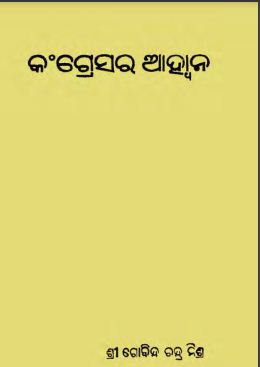Published in 1962, “Kangresara Ahwana” by Gobind Chandra Misra is a significant contribution to Odia literature that intricately examines the political landscape of India during a transformative period. Through a collection of essays, Misra artfully critiques the Indian National Congress and its role in shaping the nation’s independence movement, as well as the subsequent challenges it faced post-independence.
“Kangresara Ahwana,” which translates to “The Call of the Congress,” emerges from a time when India was undergoing significant political changes. The British Raj had ended, and a new framework for governance was being constructed. Misra, a keen observer and commentator on politics, provides readers with insights into not only the Congress party’s contributions to the freedom struggle but also its evolving role in the new democratic setup that followed.
The essays contained within this book delve deeply into various political ideologies and strategies employed by the Congress. Misra analyzes the party’s foundational principles, emphasizing its commitment to secularism, social justice, and economic development. He highlights the contributions of key leaders, including Mahatma Gandhi and Jawaharlal Nehru, while also critiquing their approaches and decisions, especially in the context of the emerging socio-political realities of independent India.
A critical theme in Misra’s work is the notion of unity in diversity. He articulates the Congress’s struggle to maintain a cohesive national identity amidst the complexities of regional, linguistic, and cultural differences. This theme remains relevant today as India continues to grapple with its diverse makeup.
Misra does not shy away from critiquing the Congress party. He acknowledges the challenges the party faced in translating its vision into effective policies. Through a candid examination of the political missteps and failures, he calls for greater accountability and responsiveness from political leaders. Misra’s critiques provide a balanced view, steering clear of excessive hero-worship, which is often found in historical narratives.
The author also reflects on the aspirations of the common people and how these aspirations sometimes diverged from the policies of the Congress. He emphasizes the need for political leaders to remain connected to the grassroots, advocating for a government that truly represents the will of the people. This call for accountability resonates strongly with contemporary political discourse in India.
Gobind Chandra Misra’s writing is marked by its clarity and persuasive argumentation. His essays are not only informative but are imbued with a sense of urgency that encourages readers to engage critically with the political issues of the time. Misra employs a straightforward, yet eloquent style, making complex political ideas accessible to a broad audience.
The book is enriched with historical context, data, and quotes from notable political figures, enhancing the depth of analysis while also making it a valuable resource for scholars and students of political science and history.
“Kangresara Ahwana” serves as more than just a critique of the Congress party; it is an invitation to engage deeply with the democratic values that underpin Indian society. Gobind Chandra Misra’s reflections provoke thought about the responsibilities of political leaders and the active participation of citizens in shaping their governance.
As we reflect on the lessons from the past, “Kangresara Ahwana” remains a pertinent text for understanding the complexities of Indian politics and the ongoing challenges of nation-building. Misra’s work not only enhances our understanding of the Congress party but also encourages us to reflect on our collective role in the democratic process.
Books Info
| Books name | Kangresara Ahwana/କଂଗ୍ରେସର ଆହ୍ବାନ |
| Editor | Santanu Kumar Acharya |
| No Of pages | 184 |
| Publisher | Grantha Mandira |
| Publication | 1962 |
| Printed At | Bandana Process Offset |
| Distributor | NA |

